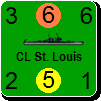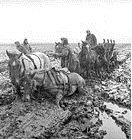Mehring
Posts: 2179
Joined: 1/25/2007
Status: offline

|
quote:
ORIGINAL: BleedingOrange
In no particular order
1. FDR needed the Japanese or Germans to actually attack the US to get them into the war. He ran his 39-40 Presidential campaign on not sending US troops to fight foreign wars. So without Japan attacking PH the US can build all the war materails they want but there is no 8th AF bombing Germany.
Already answered, but clearly you haven't got it. I will re-state with some emphasis added-
Oh! But we have no Pearl, and no declaration of war, you object. Is that really a problem or are you only prepared to entertain 'what ifs' that are quite ungrounded in reality?
Is it not remarkable that in spite of constitutional formalities, FDR had managed to manoeuvre the US into a position that, long before Pearl Harbour, the Germans regarded as a virtual state of war? The immense military output of the US witnessed from 1943 onwards was not the product of a surprised power turning reluctantly to fight a war it had no choice but to fight. It was the result of military-industrial infrastructure laid down years before, in preparation for the inevitable war. I'm sure some student of American history can draw up a list for you, of legislation passed in the US which both economically and politically prepared the US for war, and specifically with Germany. The Germans weren't blind to it, or to the war materials already coming into Briain's possession.
As you point out, Roosevelt provoked Japan into an attack. Do you think that had Adolf not obliged [when he did], he would have been unable to do the same with Germany? WAS HE NOT ALREADY DOING SO? Given the incredible mobilisation of US industry for war during 'peace' and the US's comitment to excusively supply the anti-Axis forces, do you really think that shifting the date of a formal war declaration 6 months or even a year in either way would have made any serious difference?
The US were engaging in undeclared war with Germany and pushing hard to provoke a Declaration of war.
When one deals in abstractions, one can declare the possiblity of anything that takes one's fancy. Concrete reality shows how limited were the options. below is a timeline for you. The incidents do not reveal directly the antagonistic interests motivating the conflict, but they do very much express them -
April 10, 1940 - President, acting under the Neutrality Act of 1939, extends maritime danger zone to include Scandinavian area.
May 16, 1940 - President asks for national defense funds totaling $1,182,000,000; he states that Army and Navy should be equipped with 50,000 aircraft a year.
May 17, 1940 - President announces plan for recommissioning 35 more destroyers.
June 12, 1940 - [us] Navy Department awards contracts for 22 new warships.
June 14, 1940 - Fri. President signs "11% Naval Expansion Act" increasing the carrier, cruiser, and submarine tonnage of the Navy by 167,000 tons, and auxiliary shipping by 75,000 tons.
June 15, 1940 - President approves an act to increase naval aviation to a strength of not more than 10,000 aircraft.
June 17, 1940 - Adm. H. R. Stark, Chief of Naval Operations, asks $4 billion for construction of "two-ocean Navy.
June 27, 1940 - President declares a "national emergency" and invokes Espionage Act of 1917 to exercise control over shipping movements in territorial waters and in vicinity of Panama Canal.
July 1, 1940 - German U-boats attack merchant ships in the Atlantic.
July 19, 1940 - President signs Naval Expansion Act providing, among other things, for 1,325,000 tons of combatant shipping, 100,000 tons of auxiliary shipping, and 15,000 aircraft; this "Two Ocean Navy" act will expand the Fleet 70 percent.
Aug 17, 1940 - Hitler declares a blockade of the British Isles.
Sept 16, 1940 - United States military conscription bill passed.
Sept 27, 1940 - Tripartite (Axis) Pact signed by Germany, Italy and Japan.
Oct 8, 1940 - Unites States advises citizens to leave the Far East.
Japan protests United States embargo on aviation gasoline and scrap metal.
Nov 5, 1940 - Roosevelt re-elected as U.S. president.
Nov 8, 1940 - SS CITY OF RAYVILLE sinks after hitting a mine laid by German raider off Cape Otway, Bass Strait, Australia; first United States merchant vessel sunk in World War II.
Jan 29, 1941 - United States-British staff conversations to determine joint strategy in case of United States involvement in the war, begin in Washington.
Jan 30, 1941 - Germany announces that ships of any nationality bringing aid to Great Britain will be torpedoed.
March 11, 1941 - President Roosevelt signs the Lend-Lease Act.
March 30, 1941 - Unites States takes possession of German, Italian, and Danish ships in United States Ports.
April 27, 1941 - American-Dutch-British Conference at Singapore ends, having reached agreement on combined operating plan of local defense forces in the event of war with Japan; Capt. W. R. Purnell, USN, is senior United States representative.
June 14, 1941 - United States freezes German and Italian assets in America.
June 19, 1941 - Germany and Italy request closure of United States consulates.
June 21, 1941 - State department requests closing of all Italian consulates in United States territory.
June 2, 1941 - Japan recalls her merchant ships from Atlantic Ocean, and calls more than 1 million army conscripts.
July 26, 1941 - Roosevelt freezes Japanese assets in United States and suspends relations.
Aug 1, 1941 - United States announces an oil embargo against aggressor states.
Aug 14, 1941 - Roosevelt and Churchill announce the Atlantic Charter.
Aug 27, 1941 - Japan protests shipment of United States goods to Vladivostok through Japanese waters.
Sept 7, 1941 - United States merchant ship STEEL SEAFARER is sunk by German air attack in Gulf of Suez.
Oct 17, 1941 - Destroyer KEARNY (DD-432)is torpedoed and damaged southwest of Iceland.
Navy orders all United States merchantmen in Asiatic waters to put into friendly ports.
Gen. Hideki Tojo becomes Japanese Premier as Konoye Government resigns.
Oct 19, 1941 - United States merchant ship LEHIGH is torpedoed and sunk by German submarine off West Africa.
Oct 31, 1941 - Destroyer REUBEN JAMES (DD-245) is torpedoed and sinks off western Iceland with loss of about 100 lives; this is the first United States naval vessel to be lost by enemy action in World War II.
Nov 8, 1941 - United States Naval Operating Base, Iceland, is established.
Nov 17, 1941 - Neutrality Act of 1939 is amended by Joint Resolution; merchant ships can now be armed and enter war zones. Saburo Kurusu, special Japanese envoy, arrives in Washington and confers with the Secretary of State.
Nov 20, 1941 - Ambassador Nomura presents Japan's "final proposal" to keep peace in the Pacific.
Nov 23, 1941 - United States occupies Surinam, Dutch Guiana, pursuant to agreement with the Netherlands government to protect bauxite mines.
Nov 25, 1941 - Japanese troop transports, en route to Malaya, are sighted off Formosa.
Nov 26, 1941 - Secretary of State submits final proposals to Japanese envoys for readjustment of United States-Japanese relations.
Nov 27, 1941 - Adm. H. R. Stark, Chief of Naval Operations, sends "war warning" message to commanders of the Pacific and Asiatic Fleets.
Nov 30, 1941 - Japanese Foreign Minister Tojo rejects United States
proposals for settling Far Eastern crisis.
quote:
ORIGINAL: BleedingOrange2. If the Japanese decided to redirect their efforts against the Soviets nobody says it had to be immediately. They could have postponed PH and drew up plans to see what unfolded. If the Soviets recover launch PH later and maybe catch the carriers there. If the Soviets continue to lose, launch an attack and try to take advantage of a weakened foe.
Yes, that works in a lot of war games where the military side of things is completely abstracted from economic and political concreteness, which, in reality drives the military. Could they have postponed it? What on earth makes you think they had such freedom of action? Do you really think that nations embark on wars that threaten their very existance out of whims and and at their will? In relation to concrete reality your alternative history is nothing but air headed nonsense. Sorry, but it 's true.
quote:
ORIGINAL: BleedingOrange3. I stated in my first post I don't think Stalin ever would have surrendered. There were people in the government that were more then willing to fight on after the loss of Moscow, but would those people have gained power? It might have been almost impossible for it to happen, but stranger things have happened.
There is nothing wrong with your television set. Do not attempt to adjust the picture. We are controlling transmission. We will control the horizontal. We will control the verticle. We can change the focus to a soft blur....
quote:
ORIGINAL: BleedingOrange4. You might have people like Pelton race for certain targets but if they didn't succeed they would lose. Right now he doesn't even try for Leningrad or Moscow. Without something to encourage a defense by the SU or a reason to attack in 42 for the Germans the game is going to continue to look like a WW1 simulation.
It's not an all sided simulation of anything at the moment. There are design flaws which appear to have been recognised and will not be remedied by gamey fudges. Logistics, and the air war are two aspects of the game that need a major overhaul and until they get it, we might as well just enjoy the game for what it is or wait for a fix.
_____________________________
“Old age is the most unexpected of all things that can happen to a man.”
-Leon Trotsky
|
 Printable Version
Printable Version











 This of course also explains why the Soviets were stubborn and wanted to keep Leningrad... which falls in every game by the way. Not that the Germans need lots of forces...
This of course also explains why the Soviets were stubborn and wanted to keep Leningrad... which falls in every game by the way. Not that the Germans need lots of forces...
 " is that Barbarossa would be some sort of massive push à la Pelton (his curent moves to grab industrial centers would be the moves of a mere aficionado)... with weak (or almost irrelevant) forces in AGN and AGS (sec regiments would be perfect if you ask me)... I'd like to see such an AAR. To have a good laugh that is
" is that Barbarossa would be some sort of massive push à la Pelton (his curent moves to grab industrial centers would be the moves of a mere aficionado)... with weak (or almost irrelevant) forces in AGN and AGS (sec regiments would be perfect if you ask me)... I'd like to see such an AAR. To have a good laugh that is 
 Attacking the Philipines = American possession = American personnel
Attacking the Philipines = American possession = American personnel  It's an act of war. Ergo... The other option (which was of course discarded) was NOT attacking the Philipines in the first place. Which was really dangerous. From this position the Americans could have blocked the flow of raw marterials and OIL the Japanese desperately needed... It's not only the Formosa Strait, they would have created a really big mess
It's an act of war. Ergo... The other option (which was of course discarded) was NOT attacking the Philipines in the first place. Which was really dangerous. From this position the Americans could have blocked the flow of raw marterials and OIL the Japanese desperately needed... It's not only the Formosa Strait, they would have created a really big mess 

 New Messages
New Messages No New Messages
No New Messages Hot Topic w/ New Messages
Hot Topic w/ New Messages Hot Topic w/o New Messages
Hot Topic w/o New Messages Locked w/ New Messages
Locked w/ New Messages Locked w/o New Messages
Locked w/o New Messages Post New Thread
Post New Thread